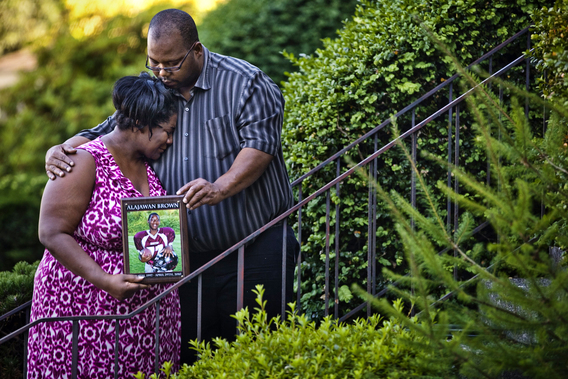By Sara Jean Green | The Seattle Times
The state Department of Corrections (DOC) has agreed to pay $3 million to settle a wrongful-death lawsuit filed by the parents of a 12-year-old Skyway boy shot in the back by a known gang member on community supervision.
Alajawan Brown stepped off a Metro bus on April 29, 2010, after buying a pair of football cleats with money he made doing lawn work for neighbors.
Curtis Walker — a longtime member of the Blood Pirus street gang who had been in a shootout with a group of Crips gang members at a nearby apartment complex minutes earlier — got out of his car, which was stopped at a red light, and fired twice at Alajawan, striking the boy once in the back.
Alajawan died in the parking lot of a 7-Eleven at South 129th Street and Martin Luther King Jr. Way South, less than two miles from his home. Wearing a blue-and-black jacket, the colors worn by the Crips, his death was a case of mistaken identity.
After a three-week trial in early 2012, Walker, now 42, was found guilty of first-degree murder and unlawful possession of a firearm, and was sentenced to 50 years in prison. Walker, who had eight prior convictions for felony assault, tried to pin Alajawan’s death on another man.
But it wasn’t until Walker’s sentencing hearing in March 2012 that Alajawan’s parents, Ayanna and Louis Brown, learned Walker was on DOC supervision for a drug crime and was barred from possessing firearms, said attorney Nate Roberts, who with co-counsel Evan Fuller represented the Browns in their wrongful-death suit, which was settled on Thursday.
DOC spokesman Jeremy Barclay said Alajawan’s death was a tragic loss, but he declined to comment on the specifics of Walker’s community supervision. The department was represented in the lawsuit by the state Attorney General’s Office.
“The department was able to achieve this week’s resolution as a result of the collaborative effort of the Attorney General’s Office and the attorneys representing the Brown family, and for that we are grateful,” Barclay said Friday.
In summer 2012, Ayanna and Louis Brown were profiled in The Seattle Times after they founded the Alajawan Brown Foundation, also known as Alajawan’s Hands. In memory of their son, the couple set up a scholarship fund, and offer tutoring services and hold annual drives to collect backpacks and school supplies, which are then given to low-income schoolchildren in the Renton School District.
The Browns filed their wrongful-death lawsuit against DOC in King County Superior Court in November 2014. DOC argued in court that the lawsuit was filed after the three-year statute of limitations had run out, and a judge agreed, dismissing the suit. The Browns then appealed to the state Court of Appeals.
In December, a panel of appellate judges unanimously sided with the Browns, holding that the clock didn’t start ticking on the statute of limitations until Walker was found guilty of Alajawan’s murder.
“The identity of the killer was in question until the verdict was reached,” Roberts said.
After the Browns hired Roberts and Fuller, the attorneys filed a public-disclosure request with DOC and learned Walker “had a lot of law-enforcement contact while on supervision,” Roberts said. They also received an entry from the DOC’s computer system that showed a concerned citizen had phoned Walker’s community-corrections officer eight days before Alajawan was killed and reported that Walker had assaulted his girlfriend, threatened her with a gun and was believed to be selling marijuana out of his apartment, Roberts said. But nothing was done, he said.
Walker routinely refused to answer the door when his community-corrections officer attempted to make home visits — also a flagrant violation of his supervision, according to Roberts.
“They let him have way too long of a leash. He’s a known gang member, and he’s doing the two things he’s absolutely not allowed to be doing — selling drugs and possessing firearms — and they let him get away with it,” Roberts said. “It’s maddening to see that.”
For the Browns, the lawsuit was a way to hold DOC accountable for its deficient supervision of Walker:
“It’s bittersweet,” Roberts said of the settlement. “They’re happy this chapter in the book is closed, but it also brings back this crippling grief.
“They would give everything in the world to have another day with their boy,” he said.

